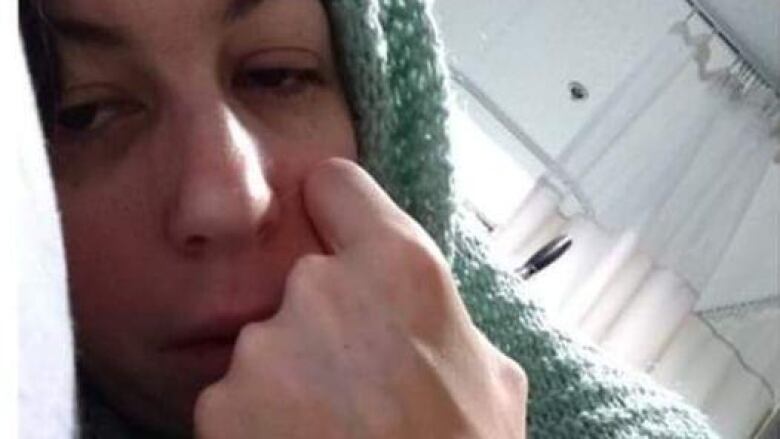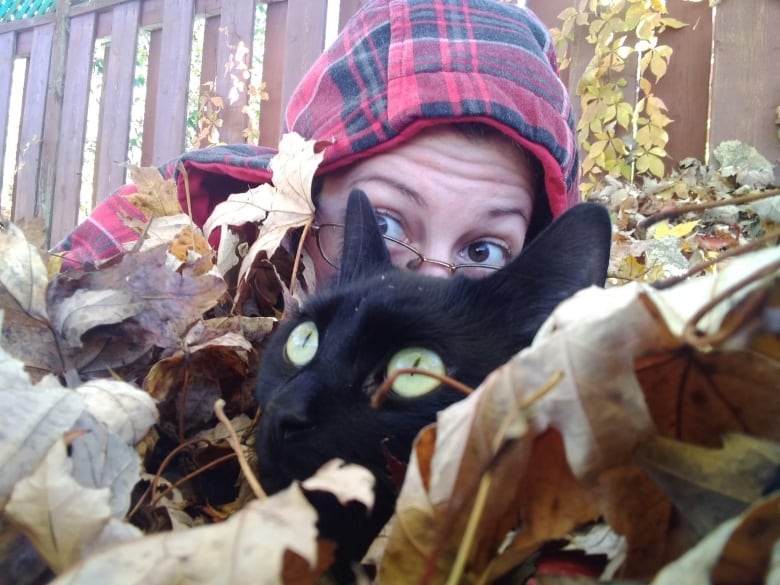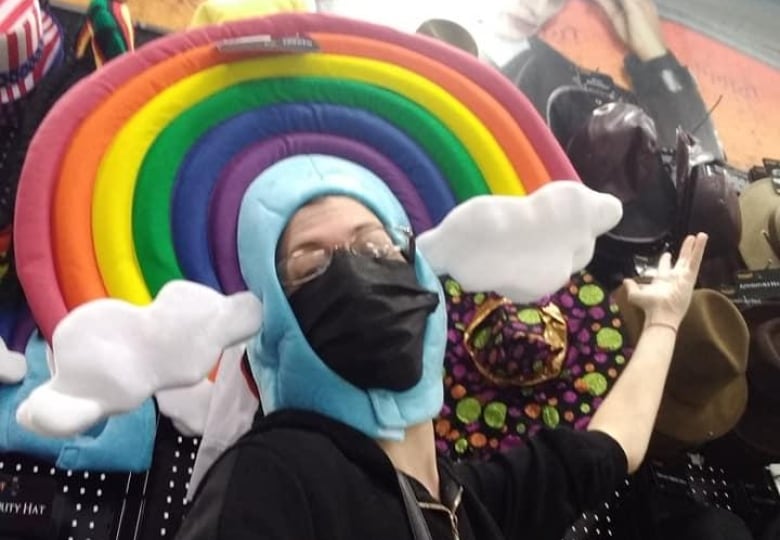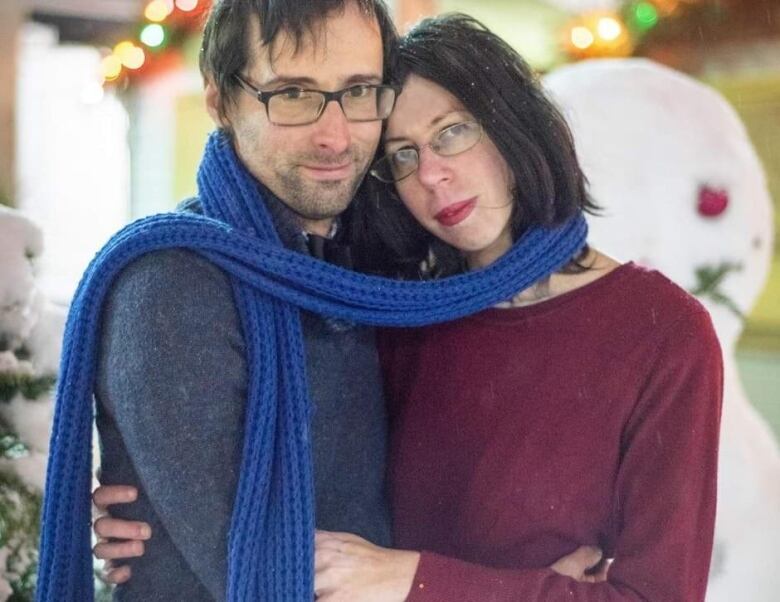I'm chronically ill and can barely get enough financial assistance to survive
I receive enough money to avoid homelessness but not enough to live and thrive

This First Person article is the experience of Alexandria Nassopoulos, who lives with a chronic illness in Montreal. For more information about CBC's First Person stories, please see the FAQ.
It seemed like a cruel joke when Medical Assistance in Dying (MAiD) pops up in my social media news feed.
As I scrolled through the articles and posts from other chronically ill Canadians, it lookedlike I'd qualifyeven without terminal cancer or a degenerative neurological disease. Out of morbid curiosity, I checked out the criteria on the Health Canada website.
It says that to be eligible I must have a "grievous and irremediable medical condition," which includes being in an "advanced state of decline that cannot be reversed" and causes "unbearable suffering."
My condition, fibromyalgia, can be summarized by chronic pain, fatigue and migraines. I was born with this condition and have lived with it day by day, going from doctor to doctor, and from hope to despair. There is no cure. This condition which regularly prevents me from doing even the most mundane tasks is never going away. It will always be there.
It's also not taken seriously, and that means I cannot afford to live and thrive.Even when my assistance gets temporarily increased, life isa struggle. I have been referred to crisis lines, only to have those crisis counsellors inform me that my issues are not an emergency. I've had doctors refuse to believe me, the public look past meand employers pass on hiring me or firing me because of my disability.
I've had mental breakdowns and one close suicide attempt. Every painkiller I have tried either reduces the pain by very little or not at all.

But an assisted death isn't what I'm looking for.I have a dark sense of humour (chronic disabilities will do that to a person), but not that dark.
Thoseposts in my feed about MAiDmade me feel disheartened and distracted. Iwent back to preparing a medical report detailing my chronic health conditions for the Quebec government so that I may beg to keep what meagre benefits I had.
Preparing the report is one of many things on my to-do list, which sadly also includes working up the strength to take a shower or make a meal. I say or, because sometimes I have to choose between the twodepending on my energy level.
I've applied to have a long-term increase to my social assistance, but the province deems my chronic condition to be temporary. I wish it was.It would be funny if it wasn't so frustrating.
Living with fibromyalgia is like having the check engine light on all the time in your car. My nervous system constantly malfunctions. I climb one set of stairs and my body reacts like I've climbed Mount Everest.
I'm in pain every waking hour of my life. It's something onenever really gets used to. But physically, I look fine. I can walk without a limp or other telltale signs of exhaustion and pain, so I get plenty of judgmentwithin the health-care system and everywhere else.
This is the second time in four years that I'mpreparing the same report becausemy assistance has been reduced. I feel like a cartographer sketching out a map of pain for a trip she's undertaken countless times. Each time, I go back to my filing cabinet to remind them that fibromyalgia is a chronic condition that I can't work, that I need help.
Perhaps this report would be more believable if my doctor wrote about how the pain in my spine prevents me from sitting at a desk job, about how the pain in my legs prevents me from standing in a retail job, about my hands often faithful companions that help me create works of art but theyswitch on a dime and betray me to the point where I couldn't even hold a plate of food or operate a cash register.

The $720 per month that I currently receive in financial assistance isn't enough to pay for a place of my own, so instead I rent a room in my mother's home, helping out with hermortgage. After my phone bill and my Spotify subscription (which is precious to me), I have $200 left to cover my groceries for the month and prices are rising fast.
Without the increased assistanceI must reapply for, there's nothing left for hobbies, savings, mobility aids or emergencies.
Some days my heart breaks for all the time I've wasted struggling, crying and begging for help. What little energy I had could have instead gone into my passions or expanding my life. I've had to shelve projects because my brain tells me I should be disgusted with myself, and it reminds me how little value society sees in me.
My pain grows and recedes all the time, but it's the looming fear of becoming homeless and ignored that haunts me daily.

I don't feel like I'm asking for much. Therapy, for starters, would be amazing. Enough income to pay for vitamins, fresh vegetables and more meat, all of whichlikely won'tcure me but would make me healthier. The ability to try other medications or long-term treatments could mean I might conceivably work in the service industry.
Then, at age 38, I might finally be able to move out of my aging mother's basement.
These aren't outrageous requests for miracle cures or a wish to win the lottery. They simply represent a standard of living that is currently out of reach for someone who sometimes can't put her arms over her head. And no, it's not because I have a disproportionately large head.
That's why when I saw the option for MAiD in my social media feed, it feltlike I've been given the options of extreme poverty or death. I'm told to seek help, but am then asked if I really need it or told flat out that I don't qualify becausemy debilitating chronic illness is temporary.
I still wake up every day, chat with my friends and visit with my loving and supportive partner. I help my mother out around the house that I can't afford to leave, and, if my illness lets me, actually do work as a costume designeror create a piece of art.
And I still have that medical report to submit. I do it because perhaps this time around my government might revisetheir definition of chronic illnesses. I do it because I'm still an optimist. I do it because there are no other options.
I know becauseI looked.
If you or someone you know is struggling, here's where to get help:
- Talk Suicide Canada: 1-833-456-4566 (phone) | 45645 (text between 4 p.m. and midnight ET).
- Kids Help Phone: 1-800-668-6868 (phone), live chat counselling on the website.
- Canadian Association for Suicide Prevention: Find a 24-hour crisis centre.
- This guide from the Centre for Addiction and Mental Health outlines how to talk about suicide with someone you're worried about.
CBC Quebec welcomes your pitches for First Person essays. Please email povquebec@cbc.ca for details.












_(720p).jpg)


 OFFICIAL HD MUSIC VIDEO.jpg)
.jpg)



























































































